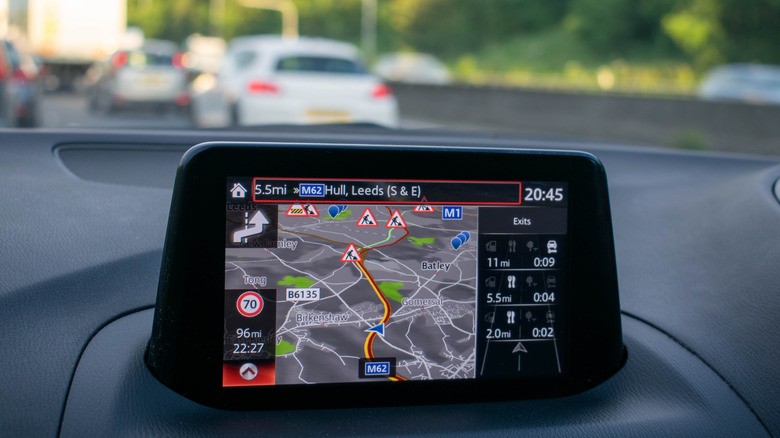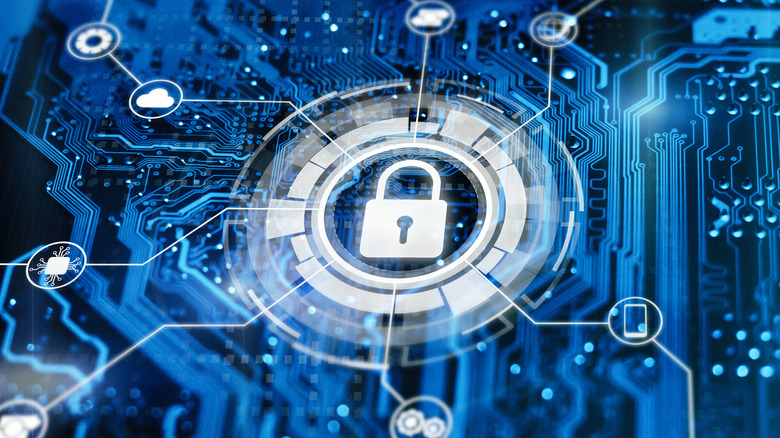Everything You Need To Know About Quantum Internet
It may sound like science fiction, but some experts believe the quantum internet could be a reality in less than a decade. The quantum internet relies on a weird area of physics where things like teleportation and time travel occur regularly (via Discover). These properties might take technology to the next level.
Quantum internet and its knock-on effects are seen as so important that governments, big businesses, and universities worldwide are pumping billions of dollars annually into its development, according to multiple sources including National Defense Magazine. What has emerged is a mixture of collaboration and arms race, with various entities working around the clock to defend themselves, gain an edge over everyone else, and push technological advancement to the next level.
The far-reaching implications could impact everything from AI development to the cryptocurrencies in your digital wallet. We could be FaceTime friends on Mars and Netflix may never be the same. Or things may not change much at all for 99% of internet users.
So let's dive into what makes the quantum internet work and how it may, or may not, affect us all.
Quantum refers to the smallest discernable unit of a physical entity
In physics, "quantum" refers to the smallest amount possible of any entity interacting with another entity. "Quantum mechanics" is the study of how these tiny units behave, and scientists have discovered that quantum units have some very unique properties. You exist and operate in physical space, as does everything you see around you. The laws of physics apply to objects in physical space — this is why physical objects can't move faster than the speed of light, forces like gravity will affect a physical object's movement, and so on.
As Space.com explains, quantum units are capable of existing outside the physical realm. As a result, those units operate under a different set of rules. In the quantum world, things can travel faster than light, go back in time, and even teleport.
Physical objects can't operate in quantum space, so your Dr. Who fantasies are unlikely to play out soon. However, objects from quantum space can enter the real world, which opens up some exciting possibilities.
Qubits will be central to the quantum internet
Modern computing centers around things called bits. The bits in a piece of code operate in binary; they are all either set to 0 (off) or 1 (on). Each bit can switch states between on or off, and altering the state of these bits changes the program to make your computer do things.
Bits switch between 0 and 1 in less than a billionth of a second, which is not quite fast enough for some applications. Your standard computer is fine for browsing the internet, streaming TV shows, and playing Minecraft — but top scientists won't be using a MacBook Pro to crack open the mysteries of the universe. Even if hardware improves, the bits and the hardware using them exist in the physical world and are bound by those laws of physics we mentioned earlier. That means there is a hard cap on how quickly they can operate, and we may one day hit that cap.
Enter the qubit, which Microsoft defines as "the basic unit of information in quantum computing." The qubit is essentially a piece of quantum data that can operate in quantum space. As quantum space is separate from physical space, those pesky laws of physics don't apply, and the hard cap on things like the speed you can flip a switch disappears.
There's more to qubits than just raw speed
Beyond the removal of physical limitations, qubits have many other interesting properties. While a regular bit operates like a binary switch that needs to be "on" or "off" in the physical world, a qubit operates like an extreme version of Schrödinger's cat. Just as the cat is both dead and alive until the box opens to confirm its state in Schrödinger's thought experiment, a qubit's switch is off, on, and everything in between until it is brought into the physical world and forced into a binary. As Microsoft explains, units in the quantum world — including qubits — exist in infinite states at the same time.
Particles can also be "bound" to each other through quantum entanglement (via Caltech). What happens to one particle is reflected in the particle it is "entangled" with. If one particle is spinning counter-clockwise, you know with 100% certainty the other will be spinning clockwise — even if it is a billion miles away and unobservable.
According to Scientific American, physicists currently believe quantum entanglement is very fragile. This is great for the security side of the quantum internet, as any interference, like a hacking attempt, will destroy the entanglement and end the attack immediately. However, it's pretty bad for the communications side of things. Recording a message requires changing the state of something, and we currently don't have a way of changing a particle's state without destroying the entanglement.
The quantum internet has some major advantages
The main benefit of a quantum internet is security. Experts at the Harvard School of Engineering theorize a quantum internet could be "unhackable." Instead of mathematical calculations that may contain exploitable flaws, a hacker would have to find some way to break the laws of physics or quantum mechanics to gather data from a quantum communication. If a hacker did intercept a qubit in transit, the state of the qubit would change, rendering the information gathered useless while the people sending and receiving the communication would be immediately aware of the attack.
Dutch research institution TuDelft believes GPS will get a lot better as the quantum internet is implemented and evolves. Super accurate quantum clocks, instant communication, and security enhancements will make GPS systems more accurate, reliable, and less prone to outside interference — which is good news for anyone whose sat-nav regularly tells them they're driving through a lake.
These are all examples of how the quantum internet will help improve our current technology, but the main benefit of a quantum revolution is future-proofing. Removing physical limitations means taking the things we currently have further and opening up possibilities that haven't been thought of yet. Even leading quantum physicists like Eden Figueroa can't predict the exact possibilities quantum computing will unlock.
The early quantum internet will still have vulnerabilities
There are still some exploitable weaknesses in current quantum networks, all of which are physical. Technology journalist Davey Winder points out the fiber optic cables used to transfer data may be an entry point, and if the data isn't vulnerable in transit, it may still be vulnerable wherever it is stored. Although exact cloning of an unknown quantum state is impossible, a University of Ottawa team has managed to produce high-fidelity copies of photons used in communications, demonstrating the potential vulnerability of quantum data in transit. But the quantum internet will still be far more secure than any current communication method.
Researchers are building the quantum internet around the concept of quantum entanglement (via Science.org). Quantum communications currently involve entangling two photons and sending one down a fiber optic cable. Eventually, we may be able to relay data between quantum particles directly, rendering cables obsolete.
An absence of cables is unlikely to be something we see with the first incarnation of the quantum internet. Scientists are still getting to grips with exactly how quantum entanglement works. Symmetry Magazine says scientists have confirmed the existence of quantum entanglement, and found ways to control it, but have yet to understand exactly how the phenomenon works. If humanity's understanding of quantum entanglement further develops, instant communication could be a key feature of "quantum internet 2.0" when that comes around. As current communications use fiber optic cables, the first version of the quantum internet will be stuck sending data at the speed of light.
A quantum arms race makes security vital
Current high-level encryption is near enough unbreakable using existing computing equipment. Aeson Labs predicts that, outside of blind luck, the current top level of encryption would take billions of years to crack using current computing technology. The fact the FBI finds breaking into a house far easier than breaking a security key further drums home the point that modern encryption is very hard to get around. But as computers continue to improve, security needs to stay ahead of the curve.
However, an arms race is taking place between supercomputers and security systems. A supercomputer in five years might crack one of today's keys in next to no time, so security developers have to keep up. In 2019, Nature published a paper on a quantum processor that took 200 seconds to perform a task it estimates would take a conventional modern supercomputer 10,000 years. That sort of processing power is terrible news for standard security algorithms. The only response to this seems to be the level of security the quantum internet will offer.
It won't change much for regular users
The quantum internet isn't necessary for any of the everyday activities you currently perform online. That should be obvious as you're doing all these things and the quantum internet doesn't exist yet. What the quantum internet does offer is an increase in security and the ability to transfer extreme amounts of data very quickly. Regular internet users probably won't notice the security increase — logging into websites will remain the same, and most security developments will be behind the scenes.
There's every chance ordinary consumers won't need, or even have access to, the quantum internet for decades to come. People might stick to the traditional internet while governments, businesses, and scientists use the quantum internet's specific benefits. Current internet speeds are more than adequate to match current and future data transfer demands. 1GB/s internet services are available, around 50 times YouTube's requirement for 4K video streaming. The development of current systems isn't going to stop to make way for the quantum internet, and we're a long way off any kind of hard cap.
However, the speeds and possibilities quantum internet offers could impact things like the Metaverse and cloud computing. Amazon, IBM, and Microsoft already provide online access to quantum computers — so it isn't a stretch to think videogame streaming services like GeForce NOW may one day take advantage of quantum computing power and use the quantum internet to deliver it.
Technology expert Sanjay Basu, PhD, believes the quantum internet may play a vital role in the construction and functions of Meta's proposed "Metaverse". The security benefits will be essential to Metaverse's proposed economy and trading system. Concepts like quantum randomness, which uses the properties of quantum mechanics to create truly random number generation, will eliminate exploitable biases in Metaverse's algorithms.
The idea has been around since the 1970s
Quantum Key Distribution – a secure, quantum-physics-based, communication method that involves sharing encrypted keys – first emerged as an idea in the 1970s, when Columbia University physicist Stephen Wiesner saw communications potential within the laws of quantum physics. In the mid-1980s, Weisner's idea was then taken on and developed by IBM's Charles Bennett and the University of Montreal's Gilles Brassard. Bennett and Brassard managed to create and demonstrate a working model of QKD in 1989; it has now become one of the building blocks of the quantum internet.
Several governments are very interested in its development because of the high level of security and communication benefits a quantum internet would bring. Several companies — including Amazon, Google, IBM, and Microsoft – have also thrown their respective hats into the quantum ring.
Scientists in China, the Netherlands, and The United States have hit significant milestones. The Chinese Government is pushing the boundaries of how far quantum data can be transmitted. Researchers from QuTech in the Netherlands have created a viable entanglement-based quantum network, and scientists at Caltech in the U.S. have created quantum storage by chaining atoms together.
It may make current cryptocurrencies and NFTs obsolete
The key benefits of blockchain-based systems are security and decentralization. The quantum revolution is a threat to these systems in many ways, and most of these threats center around security.
As mentioned, quantum computers may be particularly adept at cracking current algorithms, some of which generate the security keys people use to keep their cryptocurrencies safe. There is also the risk of a quantum computer simply destroying the blockchain — the system things like cryptocurrencies and NFTs rely on – through brute force alone (via City AM).
The concern is genuine and has led to a focus on "quantum proofing" the cryptocurrency community, according to CNET. Several new currencies have used "quantum proofing" as a selling point, while companies like IBM are playing both sides — developing cutting-edge quantum processors and "quantum-proof" encryptions at the same time.
Although some crypto-commentators, like Forbes' Roger Huang, aren't as convinced of the threat, the quantum revolution is too big a risk to ignore for many in the crypto community. It is one of the areas that will develop rapidly and probably turn to the quantum internet itself for protection from the terrifying number-crunching abilities of quantum processors.
Computing itself will be pushed beyond its physical limits
Quantum computing has been mentioned several times in this article, mainly because the quantum internet and quantum computing are so deeply intertwined that the two are difficult to separate. The quantum internet itself will be central to how the most powerful supercomputers operate.
Just as multiple computers can be networked today, quantum computers will also link together and combine their resources. This will result in several global quantum supercomputers working towards solving humanity's most complex problems — as well as working to counter other quantum computers much as current supercomputers do (via Quantumrun). The possibilities of the quantum internet will eliminate a lot of the inefficiencies modern networking suffers from. This could allow multiple devices to function as one machine — similar to how the processor of the device you're reading this on probably has several cores — which would boost the amount of computing power available (via SingularityHub).
The ability to connect devices in tandem might also solve problems related to space, power requirements, and cooling; as ExtremeTech notes, current quantum processors need to be cooled with liquid nitrogen, which adds bulk and requires specialist facilities.
How does Web3 play into the quantum internet?
Quantum computing and the quantum internet could play a large part in the development of Web3. Artificial Intelligence (AI) and machine learning are central to the development and functions of Web3, and quantum computing has the power required to take AI development to the next level.
Computing will be driven forward by the quantum internet, leading to what experts at the University of Chicago call "supercharged" AI development. Better AI has far-reaching benefits in several fields, including web development and machine learning. In short, if quantum computing becomes both viable and accessible soon, the development and implementation of Web3 will benefit massively.
The quantum internet may also be a threat to Web3. The proposed decentralized web will be reliant on blockchain technology (via Exploding Topics). As we've discussed, the current blockchain design is highly vulnerable to quantum computers. Like Web 2.0, Web3 doesn't have a hard launch — it will roll out piece by piece. But, like cryptocurrencies, it will have to adapt quickly to match the security challenges quantum computing and the quantum internet will create.
We might still be a long way off
Optimistic experts say we could see a functional quantum internet by 2030, but "experts" have also claimed we've been "within a decade" of nuclear fusion becoming a viable power source for a while, too. Worse yet, when quantum internet 1.0 finally does come around, it may not be as impressive as expected. Based on how quantum networks currently operate, the quantum internet's initial release will be heavily reliant on current tech, namely fiber optic cables and relays. Large parts of the current internet already use fiber optics to transfer data at near lightspeed.
Some of the really far-out stuff will still elude us, as well. While quantum units can do seemingly impossible things in their world, when we bring them into ours they're just as limited by physics as we are. Because of the difficulties involved, TuDelf can't predict when quantum technologies will actually become available.
Take faster-than-light communication, which we have mentioned several times. If it were made possible, instant communication at any distance would be a staggering achievement. The problem is that it relies on entanglement, which is very delicate. Currently, we can measure parts of one entangled particle and know the measurement of the other. The trouble is that you can't communicate by measuring previously set things. Changing properties of one particle, like changing a 1 to a 0, could be used to relay messages, but as soon as we do anything more than measure a particle, the entanglement breaks.
Our understanding of entanglement and quantum mechanics is still constantly developing. A breakthrough could make possible things we currently consider to be impossible. Equally, new discoveries could just shatter our dreams entirely. If Einstein's takes on quantum mechanics can be proven wrong, anyone's can.












